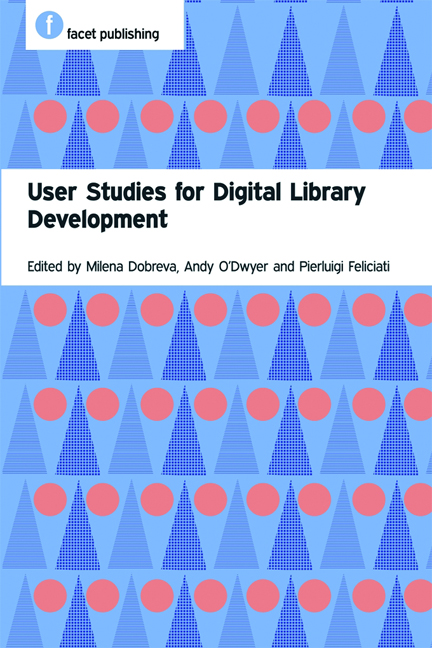Book contents
- Frontmatter
- Contents
- Preface
- Acknowledgements
- Abbreviations
- Glossary
- 1 Introduction: user studies for digital library development
- PART 1 SETTING THE SCENE
- 2 Models that inform digital library design
- 3 User-centric studies
- 4 Design issues and user needs
- 5 Users within the evaluation of digital libraries
- PART 2 METHODS EXPLAINED AND ILLUSTRATED
- PART 3 USER STUDIES IN THE DIGITAL LIBRARY UNIVERSE: WHAT ELSE NEEDS TO BE CONSIDERED?
- PART 4 USER STUDIES ACROSS THE CULTURAL HERITAGE SECTOR
- PART 5 PUTTING IT ALL TOGETHER
- Index
5 - Users within the evaluation of digital libraries
from PART 1 - SETTING THE SCENE
Published online by Cambridge University Press: 08 June 2018
- Frontmatter
- Contents
- Preface
- Acknowledgements
- Abbreviations
- Glossary
- 1 Introduction: user studies for digital library development
- PART 1 SETTING THE SCENE
- 2 Models that inform digital library design
- 3 User-centric studies
- 4 Design issues and user needs
- 5 Users within the evaluation of digital libraries
- PART 2 METHODS EXPLAINED AND ILLUSTRATED
- PART 3 USER STUDIES IN THE DIGITAL LIBRARY UNIVERSE: WHAT ELSE NEEDS TO BE CONSIDERED?
- PART 4 USER STUDIES ACROSS THE CULTURAL HERITAGE SECTOR
- PART 5 PUTTING IT ALL TOGETHER
- Index
Summary
Introduction
Digital libraries (DLs) are complex information systems and, as such, they are operated by or involve humans. They are used by people with real needs, competencies, experiences and expectations and they function within environments that aim either to produce or to transform digital resources. One of the ways to measure production and transformation is user studies, and various chapters in this book underline the multidisciplinary nature of this field. User studies help researchers to explore several facets of the sociotechnical nature of DLs. Even in the most systemic views of DL evaluation, the users – regardless of their role – are significant participants and provide meaningful information through their perceptions, opinions and cognitive status. It is true, however, that the boundaries between user studies and evaluation activities are not always clear. The ambiguity is caused by the fact that user studies, usercentred design and DL evaluation are pieces of the same jigsaw that make up well-designed DLs. There are definite commonalities between these three areas, as well as critical differences, and this chapter will tackle this issue, firstly by describing how the concept of user fits into several evaluation models, secondly by providing examples of where user studies and evaluation interweave successfully, and thirdly by making an explicit distinction of their roles and contribution in the evolution of DL systems.
The user in evaluation modelling
During the last 20 years the presence and the role of users in DL evaluation has been growing steadily. Paola Marchionni has presented a number of possible ways of involving users in the development of DLs, including users’ feedback, facilitation of users’ engagement, determination of the DL service's impact and so on, sharing emphatically their potential benefits through examples from the JISC Digitisation Programme (Marchionni, 2009). At the same time, evaluation models that have emerged in the last decade have placed users at the centre of their study, as a result of the changed view of users, from passive ‘actors’ who only use interfaces and services, to drivers of DL development. Thus, the users are an integral part in several modelling efforts, either formal or informal.
- Type
- Chapter
- Information
- User Studies for Digital Library Development , pp. 51 - 62Publisher: FacetPrint publication year: 2012



